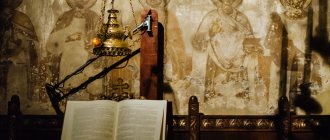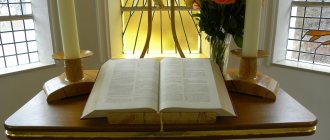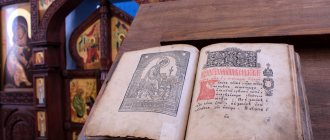The history of writing Psalm 139
The authorship of Psalm 139 belongs to David. The song-cry tells about insidious enemies and their evil machinations. According to theologians, the text was written at a time when the ruler of Ancient Israel was betrayed by his son.
Watching Absalom gather troops against him, the king was about to flee Jerusalem. Seriously ill at that time, he could not resist his cunning, and therefore silently looked at the intrigues weaving around him. But, apparently, he still did not fully believe that his son was capable of betraying him, and therefore he was in the Holy Land until the last.
Psalm 139 is read in difficult life circumstances
Psalm 126
The Psalter consists of songs of thanksgiving, praise, petition and songs of lamentation. Many people know the psalmist, king and prophet David, who wrote many prayers important for Christianity. However, the Psalter includes songs that were created over 800 years and not all of them were written by David.
The songs were written by various clergy and even King Solomon's son, but Psalm 126 was written several decades after Solomon's reign. Yet this psalm is extremely important.
In Church Slavonic with accents
1 Unless the Lord builds the house, those who build it labor in vain. Unless the Lord preserves the city, watch in vain.
2 It is in vain that you will grow gray, eating the bread of sickness, when He gives sleep to His beloved.
3 Behold the heritage of the Lord, the reward of the fruit of the womb.
4 Like arrows in the hand of a mighty man, so are the sons shaken off.
5 Blessed is he who gets his desire from them. They will not be ashamed when they speak against their enemies in the gates.
In Russian
1 Unless the Lord builds the house, those who build it labor in vain; If the Lord does not guard the city, the watchman watches in vain.
2 In vain do you rise early, sit up late, eat the bread of sorrow, while He gives sleep to His beloved.
3 This is the heritage of the Lord: children; the reward from Him is the fruit of the womb.
4 Like arrows in the hand of a mighty man, so are young sons.
5 Blessed is the man who fills his quiver with them! They will not be left in shame when they speak to their enemies at the gates.
History of writing
In some versions of the text of Psalm 126 there is a postscript “Solomon”, but this speaks not of time, but of place. Under King Solomon, a temple was built in Jerusalem, which was destroyed during the captivity of the Jews. When, after many years, the Jewish people returned to Israel, they set about restoring the temple.
Psalm 126 is part of the Song of Ascension, a collection of psalms sung during the festival sacrifices in Jerusalem. The text contains a description of the relationship between people, their voluntary work to restore the temple and the relationship between man and God. People get tired of work, quarrel and argue, which interferes with work, and only trust in God's will and help saves the people.
We advise you to study Congratulations on Peter and Paul Day
When to read Psalm 126?
The song can be considered eternal and always relevant, since it draws attention to the most important gift of the Lord - children. Psalm 126 should be read with gratitude and praise.
It is used in petitions for consolation and blessing in various matters.
Any prayer strengthens faith and enriches the soul, and reading Psalm 126 can also bring good luck. Hope and sincere faith in the Lord will be a support in all situations; the Lord will always help his servant not to go astray from the right path.
Interpretation of Psalm 126
The song was written for specific events that happened to the Jewish people, but over time it became universal. Any Christian should know the text of Psalm 126, since the main idea that can be traced in it is that one should rely only on the Lord and follow His will in any situation.
The interpretation of Psalm 126 is best analyzed verse by verse:
- Verse 1 - more than one thing, the structure and decision will not be successful unless there is the blessing of the Lord. The house here acts as a collective concept, by which one should understand not only the building, but even the family.
- Verse 2 – with God’s mercy, any work will be successful, while work that is displeasing to the Lord from morning to night will not bring either worldly blessings or peace. The righteous, blessed by God, will find peace and sleep.
- Verse 3-5 – God’s greatest mercy is children. They are never born without the will of the Lord, so they should be accepted as a gift, as a gift from God. For a wise person, children will be support and weapons, like arrows in a quiver, which should serve for the good, that is, be raised correctly.
Reading rules
There are no strict rules when performing songs from the Psalter, but there are a number of recommendations. At home, you are allowed to read Psalm 126 in Russian, but it is advisable to do this in front of icons and with a lit candle. The words do not need to be spoken out loud, since the Lord also hears the thoughts of believers. You should not turn to prayer if its text is unclear and not close. You should understand the interpretation of the psalm, and perhaps contact a clergyman for clarification. A sincere prayer, even if it has not been memorized, will be heard by the Lord, and the request will be fulfilled.
Theological meaning and interpretation
Psalm 139 conveys the despair of David, who complains to the Creator, talking about his enemies, and asks Him for help. The first four verses tell about the intrigues, lies, and atrocities committed by Absalom. He turns his subjects away from the king, sowing doubts in their heads, as if the ruler is not interested in the problems of the common people.
Next, the author turns to the Creator, hoping that He will save him from suffering, protect him, and impose punishment on the guilty. David has long lost faith in people, and therefore his last hope is the Lord God.
From verses 9 to 12, the king asks the Most High Father for intercession, righteous judgment and worthy punishment for his enemies. He believes that his actions did not violate God's law. Thinking in this way, the Israeli ruler hopes for fair retribution to everyone according to their deserts. At the end of the prayer, the author appeals to all Christians to praise the Creator as a merciful but strict Judge.
Why read Psalm 148?
There is a certain time for reading prayers in the temple. It is read morning and evening. At home, a believer can turn to the Lord at any time.
The chant is ancient and based on the basic needs of the people of that time. Previously, the glorification of the Almighty was free of charge. But the Creator, by His mercy, could perform a miracle that would certainly please people. It could be a rich harvest, protection from natural disasters, and so on.
However, today the psalm has not lost its value. It also provides protection from many of the dangers associated with hard work. Historical findings prove that the song was important to believers of the past. In houses they copied it on a piece of paper and always carried it with them in their breast pocket, like a talisman.
Reading rules
Psalm 139 is part of the 19th kathisma, which includes nine selected texts of the Psalter (Ps. 134-142). It is read at weekly services and also twice during Lent. You can do this at home at any time when your soul is filled with confusion. When difficult situations, life difficulties or troubles arise, you should pray 40 times. The song helps:
- improve relationships with loved ones;
- avoid an unfair trial;
- resolve conflicts in family or work.
Before reading the prayer, it is better to light a candle or lamp, since in Orthodoxy fire is one of the earthly manifestations of the Lord God.
When there are quarrels in the family
In case of conflicts at work
For false accusations and slander
Rules of prayer
Reading the prayer is aimed at receiving support and help from the Creator. There are no restrictions on reading time at home. You can speak at any time in Russian. For an ordinary person, Church Slavonic words are not entirely understandable. The Russian version will be more correct, because it allows you to know the meaning of each word. Pointless repetition of what has been written will not bring any benefit.
When starting to pray, you need to clear your mind of resentment and irritation. Establish control over body and spirit. Only then will prayer become the core of life.
Before reading the psalm, you should light a lamp or a candle in front of the images. For Christians, fire is the earthly manifestation of the Savior. Try to get all extraneous problems out of your head. It is advisable that no one interfere with communication with the Creator.
Text of Psalm 139 in Russian
During the service, the psalm is read in Church Slavonic, however, you can also pray in Russian at home. The main rule is to understand what is being said, know the history of writing, and also delve into the essence of the text with all your heart.
1 To the director of the choir. Psalm of David.
2 Deliver me, O Lord, from the evil man; save me from the oppressor:
3 they think evil in their hearts, every day they take up arms in battle,
4 They sharpen their tongue like a serpent; the poison of the asp is under their lips.
5 Keep me, O Lord, from the hands of the wicked; keep me from the oppressors who are planning to make my steps slip.
6 The proud have hidden snares and snares for me, they have spread a net along the road, they have laid out snares for me.
7 I said to the Lord: You are my God; Hear, O Lord, the voice of my prayers!
8 Lord, Lord, the power of my salvation! You covered my head on the day of battle.
9 O Lord, do not give what the wicked desires; do not give success to his evil plan: they will become proud.
10 Let the evil of their own lips cover the heads of those around me.
11 Let burning coals fall on them; let them be thrown into the fire, into the abyss, so that they will not rise up.
12 A man of evil tongue will not be established on earth; evil will drag the oppressor to destruction.
13 I know that the Lord will bring justice to the oppressed and justice to the poor.
14 Yes! The righteous will praise Your name; the blameless will dwell before You.
Only by opening your heart to God the Father can you trust in His help. Therefore, you need to read the Psalter sincerely, renouncing everything that exists, devoting your thoughts only to communication with the Creator.
If you find an error, please select a piece of text and press Ctrl+Enter.
Psalm of David 63
- History of writing and meaning of the psalm
- Interpretation of the Psalm
In the life of a Christian, secret and insidious conspiracies are not uncommon, however, any curse is opposed by the protection of the Creator. Psalm of David 63 is the king’s prayer appeal to God with a request to protect him from lies and untruths, to grant the protection and mercy of the Lord.
History of writing and meaning of the psalm
Slander, gossip, untrue rumors are the enemies of man that are very difficult to fight. It is impossible to prove your rightness and innocence everywhere and to everyone.
In Psalm 63, David asks God for protection and help
This problem did not escape King David during the period of his son Absalom’s uprising against him, who, by spreading incredible rumors about cruelty and extortion, tried to undermine his father’s authority and thus weaken his power.
Important! Psalm 63 helps to find inner peace in situations where gossip, false slander and curses surround fear and deprive the life of a righteous person of calm and peace.
Interpretation of the Psalm
At the very beginning of Psalm 63, King David emphasizes that he gives the entire situation around him to God in prayer. Fear of an enemy who spreads rumors and can attack anywhere at any time paralyzes David's life.
1 To the director of the choir. Psalm of David.
2 Hear, O God, my voice in my prayer, preserve my life from the fear of the enemy;
3 Protect me from the plans of the treacherous, from the rebellion of evildoers,
4 who have sharpened their tongue like a sword; strained your bow - a sarcastic word,
5 to secretly shoot at the blameless; they suddenly shoot at him and are not afraid.
6 They were confirmed in their evil intentions, they took counsel to hide the snare, saying: who will see them?
7 They seek out untruths, make investigation after investigation, even to the inner life of a person and to the depths of the heart.
8 But God will strike them with an arrow; suddenly they will be wounded;
9 They will smite themselves with their tongue; all who see them will depart from them.
10 And all men will fear and proclaim the work of God, and understand that it is His work.
11 But the righteous will rejoice in the Lord and trust in Him; and all the upright in heart will boast.
In verse 3, the psalmist asks God to protect him from evil plans, thereby stopping the rebellion of his son Absalom.
Verse 4 clearly defines the power of gossip, it calls untrue rumors a sword, a sharp tongue a bow, striking straight to the heart, through the word of slander.
Enemies are afraid to offend an innocent person in a public place; they do it secretly, prepare for a long time, and then attack instantly. The priests tried in every way to denigrate Jesus, but they were very afraid of people, so they acted secretly, vilely, using the spread of gossip and bribery of false witnesses.
Secret enemies are much more dangerous than an enemy openly going into battle; their evil thoughts, like sticky nets, envelop the victim, who has no hope of salvation. Deceitful people disguise their actions, confident in impunity, however, one cannot hide from the wrath of the Creator.
With his own prayer and bitter complaint, King David expresses his worries about the treachery of the conspirators.
Psalm 63 Helps Christians Find Inner Peace
Evil people, slanderers do not disdain anything for the sake of their vile plan; in addition to lies, they rummage into the personal life of the one they attack. Absalom knew that the people loved their king, so he was afraid to attack openly, so as not to provoke the people's anger.
David calls himself blameless, of course, the king knew his sins, but in this situation he declares his innocence in the current situation.
Advice! In any situation, you should not try to solve the problem on your own. In prayer and appeal to the Creator, everything can be entrusted to Him.
Once the supporters of the villains will understand their unclean plans, see the defeat of their patrons, fear God and abandon the slanderers. Witnesses of the Lord's punishment will be filled with fear. They will quickly abandon the enemies of the righteous, so as not to become the object of God's wrath.
At the end of Psalm 63 there is praise to the Creator, on whom the king placed all his trust, and hope that God will resolve everything according to His will and that justice will triumph and the righteous will rejoice.
We advise you to study Prayers to St. Vyacheslav of Bohemia
Psalter. Psalm 63
What is the difference between a psalm and a prayer
Psalms are sacred texts of a prayer nature; they are usually read before the main prayers. Usually people limit themselves to reading only prayers, while skipping the reading of psalms. But the church advises and deeply religious people remember this - first the psalms should come, then prayer.
It is no coincidence that a huge number of verses from the psalms are included in the services held in temples and churches. Psalms can also be included in the prayers themselves. There are psalms that must be read - for example, the 50th Psalm of Repentance, which must be read once a day in the morning.
Purpose of Psalms
Psalms are songs of praise or sacred prayer songs written under the inspiration of the Holy Spirit. There are many of them and they are all contained in one book - the Psalter, which is part of the Bible.
Psalms are special texts that are not read, but sung in a special way. The specific monotony and melodiousness will affect people in a special way - both those who sing them and those who listen. The result of such an action is a certain peace, detachment from troubles and passions, and bliss. With all this, the soul seems to rise above worldly concerns, it soars in the heavens.
Athanasius of Alexandria even wrote a work on this topic, emphasizing in it that the soul is healed by singing psalms. Another well-known Christian ascetic, Efim Sirin, noted that singing psalms drives away demons, and the psalms themselves are a good remedy for night terrors, from the bustle of everyday life, an idol for children and a consolation for the elderly.
The psalms make the holidays even brighter, and if there is sadness in the sacred texts, then this is specifically godly sadness, and not oppression, which is a sin. Even the hardest heart can melt when singing psalms. For the brain, psalms are enlightenment, and for the soul, satisfaction.







